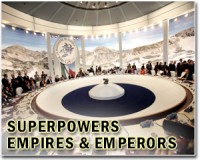| . |  |
. |
Tokyo (AFP) Jan 14, 2011 US Defense Secretary Robert Gates said Friday after a trip to Beijing that China's revelation of a stealth jet's flight test pointed to a "disconnect" between its military and civilian leaders. Gates was speaking in Japan during a week-long Asia tour focused on the threat posed by nuclear-armed North Korea and the increasing military assertiveness in the region of Pyongyang's only major ally China. The Pentagon chief stressed that China's President Hu Jintao, whom he met on Tuesday, was "in command and in charge" but also said there were signs that civilian leaders had been unaware of the J-20 jet's test flight. When Gates met Hu and other top officials on Tuesday, Chinese state media published photos that were said to show the debut flight of the J-20, the country's first radar-evading combat aircraft. The timing of the stealth fighter's flight appeared to be a snub to Washington, fuelling the sense of a military rivalry despite positive statements from both governments during the four-day visit. But Gates said Friday that, in his meeting with Chinese civilian leaders, there were "pretty clear indications they were unaware of the flight test". Gates, speaking at Tokyo's Keio University, said "this is an area where over the last several years we have seen some signs of, I guess I would call it a disconnect between the military and the civilian leadership". China's government leaders had also appeared to be initially unaware of aggressive actions taken by their naval vessels against a US Navy surveillance ship in 2009, and of an anti-satellite test in recent years, Gates said. Gates -- who later took off on a flight to South Korea -- renewed his warnings about China's latest weaponry, which he said presented a possible threat to the US military's long-running presence in the Pacific. "Advances by the Chinese military in cyber and anti-satellite warfare pose a potential challenge to the ability of our forces to operate and communicate in this part of the Pacific," he said. But he said Washington and Tokyo were well-placed to counter the threat with high-tech hardware and that it was not a foregone conclusion that China would turn into a military rival. "I disagree with those who portray China as an inevitable strategic adversary of the United States," he said. "We welcome a China that plays a constructive role on the world stage." Gates stressed the importance of the half-century-old US-Japan alliance and American troop presence in the country -- both to deter the volatile North Korean regime and counter China's more assertive stance. "Without such a presence, North Korea's military provocations could be even more outrageous," and "China might behave more assertively towards its neighbours", said Gates. "Without the forward presence of US forces in Japan, there would be less information sharing and coordination, and we would know less about regional threats and the military capabilities of our potential adversaries." The presence of almost 50,000 US troops in Japan, dating back to World War II, has been a source of friction over the years, with strong opposition in Okinawa over plans to relocate an air base on the southern island. However, tensions on the divided Korean peninsula and China's rising military power have renewed interest in the US-Japan alliance, with officials in Tokyo calling for bolstering defence ties with Washington. Japan's relations with China plunged to their lowest point in years over a territorial dispute involving islands in the East China Sea, called Senkaku in Japanese and Diaoyu in Chinese, last year. The row erupted in September after a Chinese fishing trawler collided with two Japanese coastguard ships near the uninhabited islets. Japan's pacifist constitution bars it from deploying troops in combat missions abroad, and US officials have long argued that the country ultimately benefits from the American military presence, with US forces guaranteeing the country's security at a relatively low cost. Gates said the US provided security to Japan at a cost of less than one percent of GDP, and that "in economic terms, this alliance has been a very good deal for Japan".
Share This Article With Planet Earth
Related Links Learn about the Superpowers of the 21st Century at SpaceWar.com Learn about nuclear weapons doctrine and defense at SpaceWar.com
 New Chinese arms aimed at US: military chief
New Chinese arms aimed at US: military chiefWashington (AFP) Jan 12, 2011 China's new weapons programs, including the J-20 stealth aircraft, appear to be directed against the United States, the highest-ranking US military officer said Wednesday. "China is investing in very high-end, high-tech capabilities and the question that is always out there is to try to understand exactly why," said Admiral Mike Mullen, head of the Joint Chiefs of Staff. "The opaqueness ... read more |
|
| The content herein, unless otherwise known to be public domain, are Copyright 1995-2010 - SpaceDaily. AFP and UPI Wire Stories are copyright Agence France-Presse and United Press International. ESA Portal Reports are copyright European Space Agency. All NASA sourced material is public domain. Additional copyrights may apply in whole or part to other bona fide parties. Advertising does not imply endorsement,agreement or approval of any opinions, statements or information provided by SpaceDaily on any Web page published or hosted by SpaceDaily. Privacy Statement |